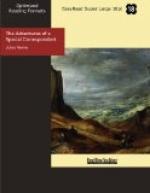In the morning Popof told me that the train, which was now traveling about as fast as an omnibus, had passed Kargalik, the junction for the Kilian and Tong branches. The night had been cold, for we are still at an altitude of twelve hundred metres. Leaving Guma station, the line runs due east and west, following the thirty-seventh parallel, the same which traverses in Europe, Seville, Syracuse and Athens.
We sighted only one stream of importance, the Kara-kash, on which appeared a few drifting rafts, and files of horses and asses at the fords between the pebbly banks. The railroad crosses it about a hundred kilometres from Khotan, where we arrived at eight o’clock in the morning.
Two hours to stop, and as the town may give me a foretaste of the cities of China, I resolve to take a run through it.
It seems to be a Turkoman town built by the Chinese, or perhaps a Chinese town built by Turkomans. Monuments and inhabitants betray their double origin. The mosques look like pagodas, the pagodas look like mosques.
And I was not astonished when the Caternas, who would not miss this opportunity of setting foot in China, were rather disappointed.
“Monsieur Claudius,” said the actor to me, “there is not a single scene here that would suit the Prise de Pekin!”
“But we are not at Pekin, my dear Caterna.”
“That is true, and it has to be remembered, if we are to be thankful for little.”
“‘Thankful for very little,’ as the Italians say.”
“Well, if they say that, they are no fools.”
As we were about to board the car again, I saw Popof running toward me, shouting:
“Monsieur Bombarnac!”
“What is the matter, Popof?”
“A telegraph messenger asked me if there was any one belonging to the Twentieth Century in the train.”
“A telegraph messenger?”
“Yes, on my replying in the affirmative, he gave me this telegram for you.”
“Give it me! give it me!”
I seize the telegram, which has been waiting for me for some days. Is it a reply to my wire sent from Merv, relative to the mandarin Yen Lou?
I open it. I read it. And it falls from my hand.
This is what it said:
“Claudius
Bombarnac,
“Correspondent,
“Twentieth Century.
“Khotan, Chinese Turkestan.
“It is not the corpse
of a mandarin that the train
is taking to Pekin, but the imperial
treasure,
value fifteen millions, sent from Persia
to China,
as announced in the Paris newspapers eight
days
ago; endeavor to be better informed for
the future.”
* * * * *
CHAPTER XVIII.
“Millions—there are millions in that pretended mortuary van!”
In spite of myself, this imprudent phrase had escaped me in such a way that the secret of the imperial treasure was instantly known to all, to the railway men as well as to the passengers. And so, for greater security, the Persian government, in agreement with the Chinese government, has allowed it to be believed that we were carrying the corpse of a mandarin, when we were really taking to Pekin a treasure worth fifteen million of francs.




